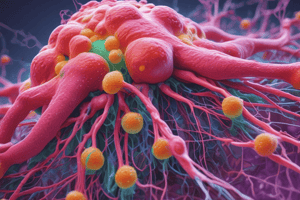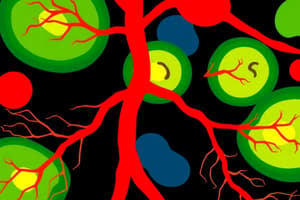Podcast
Questions and Answers
What is the primary function of the lymphatic system?
What is the primary function of the lymphatic system?
- Facilitating immune responses and removing waste (correct)
- Regulating blood pH levels
- Producing hormones for metabolic processes
- Transporting oxygen to tissues
Which of the following best describes lymph?
Which of the following best describes lymph?
- A dense liquid that carries hormones
- A type of blood with high platelet concentration
- A solid tissue comprised mostly of fat cells
- A watery fluid rich in white blood cells and proteins (correct)
Where in the body are lymph nodes primarily located?
Where in the body are lymph nodes primarily located?
- In the lungs and liver
- Throughout the circulatory system
- Only in the abdominal cavity
- At various points along lymphatic vessels (correct)
Which component of the lymphatic system is responsible for the production of lymphocytes?
Which component of the lymphatic system is responsible for the production of lymphocytes?
Which condition is characterized by the excessive accumulation of lymph fluid?
Which condition is characterized by the excessive accumulation of lymph fluid?
What is the role of the lymphatic system in relation to the immune response?
What is the role of the lymphatic system in relation to the immune response?
Which of the following structures serves as a filtering mechanism within the lymphatic system?
Which of the following structures serves as a filtering mechanism within the lymphatic system?
How does the lymphatic system contribute to homeostasis in the body?
How does the lymphatic system contribute to homeostasis in the body?
Which type of lymphocyte is primarily responsible for the adaptive immune response?
Which type of lymphocyte is primarily responsible for the adaptive immune response?
In what way does lymph circulation differ from blood circulation?
In what way does lymph circulation differ from blood circulation?
Flashcards are hidden until you start studying
Study Notes
Lymphatic System Function
- The lymphatic system plays a crucial role in maintaining fluid balance, defending against infection, and absorbing fats.
Lymph Fluid
- Lymph is a fluid that circulates throughout the lymphatic system, similar to blood but lacking red blood cells.
- Contains white blood cells, particularly lymphocytes, which are vital for immune responses.
Lymph Node Location
- Lymph nodes are small, bean-shaped organs located throughout the body, primarily clustered in the neck, armpits, groin, and chest.
Lymphocyte Production Sites
- The bone marrow and thymus are the primary sites for lymphocyte production, a crucial component of the immune system.
Lymphedema
- Lymphedema refers to a condition characterized by the excessive accumulation of lymph fluid in the tissues, often causing swelling and discomfort.
Immune Response
- The lymphatic system plays a critical role in the immune response by filtering lymph fluid and housing lymphocytes, which identify and destroy pathogens.
Lymph Filtration
- Lymph nodes act as filters within the lymphatic system, trapping foreign substances, pathogens, and cellular debris.
Homeostasis Contribution
- The lymphatic system contributes to homeostasis by maintaining fluid balance, removing waste products, and transporting fats from the digestive system.
Adaptive Immune Lymphocyte
- T lymphocytes, also known as T cells, are the primary cells responsible for the adaptive immune response, attacking specific pathogens.
Lymph Circulation vs. Blood Circulation
- Lymph circulation is a one-way system that moves fluid from tissues back to the bloodstream, unlike the closed loop of blood circulation.
Lymphatic System Functions
- The lymphatic system plays a crucial role in fluid balance, immunity, and fat absorption.
Lymph Characteristics
- Lymph is a clear fluid that circulates throughout the body, similar to blood, but lacks red blood cells.
Lymph Node Locations
- Lymph nodes are primarily located in clusters throughout the body, including the neck, armpits, groin, and abdomen.
Lymphocyte Production
- The bone marrow is responsible for producing lymphocytes, a type of white blood cell crucial for the immune response.
Lymphedema
- Lymphedema results from the build-up of lymph fluid, often due to blockage in the lymphatic system, leading to swelling in the affected area.
Lymphatic System and Immune Response
- The lymphatic system is vital to the immune response by transporting lymphocytes to sites of infection and filtering out foreign substances.
Filtering Mechanism
- Lymph nodes serve as filters within the lymphatic system, trapping and removing foreign substances, and activating the immune response.
Homeostasis
- The lymphatic system contributes to homeostasis by maintaining fluid balance, filtering waste, and transporting fats from the digestive system.
Adaptive Immune Response
- T lymphocytes are a type of lymphocyte primarily responsible for the adaptive immune response, targeting specific pathogens and remembering past infections.
Lymph Circulation
- Lymph circulation is unidirectional, moving from tissues towards the heart, unlike blood circulation which is bidirectional.
Studying That Suits You
Use AI to generate personalized quizzes and flashcards to suit your learning preferences.




